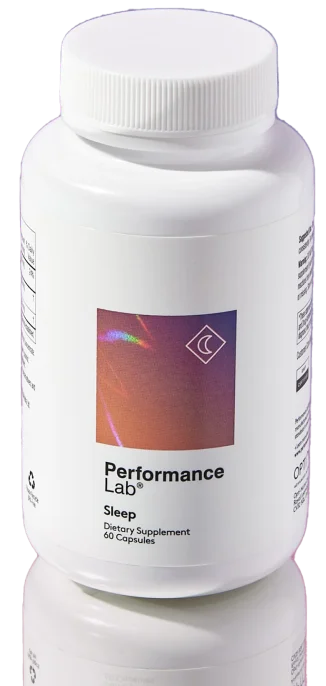Feeling drowsy and lethargic? Yawning at your desk? Feeling unproductive and irritable? You may be suffering with sleep issues, including sleep deprivation—a common issue experienced by most of us at some point in our lifetime.
According to the CDC, more than a third of U.S. adults (36.8%) report not getting enough sleep, highlighting the widespread nature of sleep deprivation. (1)
Sleep deprivation can occur if you either don’t get enough sleep, or sleep at the wrong time of day (out of sync body clock).
It is very common among shift workers, frequent travelers due to jet lag, new parents, and those who suffer from sleep disorders or other medical conditions, including migraines.
How Our Lifestyle Can Have Adverse Effects on Sleep

In recent years our lifestyles have also radically changed, and these lifestyle factors don't cater well for a good night’s sleep.
Environmental factors such as increased artificial light at night and increased screen time at home have messed with our internal clocks - contributing to sleep deprivation and sleep problems.
Studies prove that electronic screen use, for instance, disrupts sleep duration and sleep quality in adults, children and adolescents. (2)
So, what does this mean? How might we be able to help our bodies adapt to this new lifestyle without sacrificing good quality sleep?
And could magnesium supplements or melatonin supplements help? Or, better yet, can we consider taking melatonin and magnesium together for a super restful night's sleep?
Read on to find out!
Why is a Good Night's Sleep So Important?
You may be wondering why deeper sleep or better sleep is so important - after all, you're managing just fine on five hours' sleep a night, right? Right?
Unfortunately, your body is probably telling you otherwise. Several biological processes occur during sleep - it's when the body repairs itself, and restores energy. Growth hormone, crucial for tissue repair and new growth, is released during sleep. (3)
REM sleep in particular, an important stage of sleep, is when your brain processes information and handles emotions. It's connected to improved memory and problem solving skills. (4)
It's also when most of your dreams occur. Gain enough of this sleep and you'll wake up feeling fresh and alert, and likely in a better mood.
It stands to reason, therefore, that anything that interrupts your natural circadian rhythms or your sleep wake cycle - hampering your sleep - directly impacts your brain and bodily functions for the rest of the day, and possibly beyond. (5)
Which is when you may want to start researching effective natural sleeping aids, such as magnesium and melatonin.
Introduction to Magnesium and Melatonin

Magnesium is one of the 7 essential minerals our body needs to maintain optimal health and functionality, and is involved in hundreds of processes within the body.
Magnesium helps with:
- Muscle relaxation, relieving muscle spasms and tension
- Reducing tiredness and fatigue
- Improving sleep quality
- Helping to relax the muscles post-exercise
- Improving flexibility
- Repairing and replenishing skin.
- Magnesium may also help to reduce muscle pain (6).
Magnesium intake also contributes a significant amount to joint health, metabolism, and nervous system function. Magnesium-rich foods include nuts, seeds, beans, legumes, tofu, whole grains and leafy greens. (7)
When it comes to sleep troubles, taking magnesium supplements and increasing your dosage of this essential mineral can play a role in improving sleep quality by calming nerves and relaxing muscles, allowing you to fall asleep easier.
Magnesium supplementation has been linked with deeper sleep, and fewer occurrences of waking during the night. (8) It's worth noting that nearly 50% of US adults and children might not consume enough magnesium for optimal health. (9)
The Best Form of Magnesium to Aid Sleep Quality

Magnesium glycinate and magnesium bisglycinate both have a high absorption rate (10). Making both forms of magnesium supplementation particularly effective for promoting calm, relaxation, and improved sleep.
We can't talk about sleep without mentioning melatonin...
Is Melatonin Safe to Take?
Melatonin is a natural hormone produced in our bodies by the pineal gland, located in the brain, which regulates our sleep-wake cycle, otherwise known as our circadian rhythm. It is secreted in response to the absence of light, which is the signal to our body that it’s time for sleep.
On the flip side, upon waking up in the morning to natural daylight, melatonin production is suppressed and less of the hormone secreted, which is what makes us feel more awake and alert. (11)
Certain foods like cherries, tomatoes, grapes, nuts, whole grains, bananas, herbs, and oats can boost melatonin levels naturally. (12) But if you're struggling to get those in before bed, you can also find melatonin supplements.
While our body does a fine job at producing melatonin naturally, supplementation can sometimes be necessary for certain populations. Particularly those who suffer from Delayed Sleep Wake Phase Disorder, aka people who struggle to sleep during normal night hours. (13)
It may also be useful for shift workers or frequent travelers who are more susceptible to developing sleep conditions caused by irregular sleep patterns and a fall in melatonin production.
A little word of warning - be careful if taking other supplements with sedative properties while taking melatonin, such as Valerian root, as they can increase the sedating effects of melatonin further. (14)
The Best Form of Melatonin to Aid Your Sleep Cycle
While it might seem logical to think that more melatonin would lead to better sleep, the opposite is often true.
Your body needs only a small amount of melatonin to regulate sleep effectively, and experts recommend starting with a lower dose. Several factors influence how melatonin may affect you, including age. (15)
High doses, common in many synthetic dietary supplements, may bring daytime drowsiness the following day. (16) So these supplements should be limited to short-term use only.
Alternatively, you could opt for a low-dose natural sleep aid to help with the sleep process.
Low-dose melatonin, especially when sourced naturally, works in harmony with your body's circadian rhythm, gently nudging your system into a restful state without overpowering it.
This approach not only helps you fall asleep but also supports a more natural sleep cycle, ensuring you stay asleep longer and experience more restorative deep sleep stages.
Now we know what forms to look out for, how do these two supplements help keep our body clock telling the right time?
Magnesium and Melatonin Interaction: Taking Them Together

Melatonin is often considered by many to be one of the most effective and beneficial natural sleep aids on the market. However, by combining magnesium and melatonin, you can tackle potential sleep issues in two different ways.
Taking magnesium and melatonin together may promote a longer, deeper, and more restful sleep. (17)
Enough magnesium would help nourish the metabolic activities in the body, as well as relax the muscles and nerves without some of the unpleasant side effects you may get with some over-the-counter muscle relaxants.
While melatonin helps to re-establish the sleep-wake cycle or circadian rhythm and improve overall sleep quality. (18) Combining these natural sleep aids would provide a restful slumber like no other.
So, Can You Take Melatonin and Magnesium Together?
In a word, yes.
Both melatonin and magnesium have been proven to be safe to supplement (19) (20) and effective for promoting good quality sleep, as well as providing possible relief from insomnia, anxiety, migraines, and jet lag. (21) (22) (23) Together, they make a powerful sleep aid.
Who Would Benefit from Taking Melatonin and Magnesium?
Any adult who wants to improve their sleep quantity and quality could benefit from taking magnesium and melatonin together. People often turn to sleep aids when suffering from insomnia - the most common sleep disorder, characterized by difficulty falling asleep or staying asleep. (24)
If taking other medications, you should speak to your doctor first to avoid potential drug interactions.
Why You Might Want to Avoid Synthetic Sleeping Pills

The first thing those suffering with sleep deprivation normally do is go to the pharmacist to pick up an over-the-counter sleeping pill or sleep remedy. While these may help short term, they often do not have the ability to readjust your body clock and help long-term.
These and prescription-only sleep aids can also come with a whole host of side effects and possible drug interactions if you're taking certain medications, so it’s important to familiarize yourself with the possible effects that you may encounter. (25)
Synthetic sleeping aids and sleeping pills are simply a short-term solution to what would often be a longer-term problem! You probably don't want to take them for extended periods.
In contrast, natural dietary supplements, such as magnesium supplements and low-dose melatonin can help tackle sleep deprivation by addressing the root cause of sleep issues, such as your internal clock. Helping to improve sleep quality and promoting relaxation in the longer term.
The Best Sleep Aids for Restful Nights

Now that we have established that both magnesium and melatonin are a match made in heaven for those suffering with poor quality sleep, how can we best take this supplement?
Choosing the right magnesium supplement for sleep is crucial as magnesium helps regulate nerve and muscle function, blood pressure, and blood sugar levels, and can improve sleep quality by affecting melatonin levels. (26)
Performance Lab Sleep contains a combination of magnesium, L-tryptophan, lemon balm and natural low-dose melatonin derived from CherryPURE® Montmorency tart cherry, to accelerate sleep onset and encourage drowsiness by supplying melatonin and signaling for serotonin.

This supplement soothes sleep-disruptive spasms, aches, and involuntary movements, enhancing the relaxation of nerves and muscle to provide a more sound night’s sleep.
Sleep is a safe, non habit forming supplement that makes it easier to drift off. Supporting better rest, repair, and regeneration. With no lingering grogginess, so you wake up refreshed and ready to get to it!


- Centers for Disease Control and Prevention. (2022). Sleep and sleep disorders: Adults sleep facts and stats. U.S. Department of Health & Human Services. https://www.cdc.gov/sleep/data-research/facts-stats/adults-sleep-facts-and-stats.html
- Baranyi, G., & Kleiser, R. (2024). Association of screen use before bedtime with sleep quality among US adults. JAMA Network Open, 7(2), e240133. https://jamanetwork.com/journals/jamanetworkopen/fullarticle/2831993
- Science News Today. (2023). Why we sleep: Biological mechanisms behind rest and recovery. https://www.sciencenewstoday.org/why-we-sleep-biological-mechanisms-behind-rest
- Stickgold, R., & Walker, M. P. (2013). Sleep-dependent memory triage: Evolving generalization through selective processing. Trends in Cognitive Sciences, 17(10), 504–510. https://www.sciencedirect.com/science/article/abs/pii/S1364661318300706
- Cleveland Clinic. (2022). Circadian rhythm disorders. https://my.clevelandclinic.org/health/diseases/12115-circadian-rhythm-disorders
- Northwestern Medicine. (2024, December). Why Magnesium Matters. Retrieved from https://www.nm.org/healthbeat/healthy-tips/nutrition/Why-Magnesium-Matters
- U.S. Department of Agriculture, National Agricultural Library. (n.d.). Magnesium, Mg (mg). Retrieved from https://www.nal.usda.gov/sites/default/files/page-files/magnesium.pdf
- Breus, Michael & Hooper, Stephanie & Lynch, Tarah & Hausenblas, Heather. (2024). Effectiveness of Magnesium Supplementation on Sleep Quality and Related Health Outcomes for Adults with Poor Sleep Quality: A Randomized Double-Blind Placebo-Controlled Crossover Trial. 10.21203/rs.3.rs-3958974/v1.
- Sleep Foundation. (n.d.). Using magnesium for better sleep. Retrieved May 2, 2025, from https://www.sleepfoundation.org/magnesium
- ScienceDirect. (n.d.). Magnesium Glycinate. Retrieved from https://www.sciencedirect.com/topics/medicine-and-dentistry/magnesium-glycinate#
- Claustrat, B., Brun, J., & Chazot, G. (2005). The basic physiology and pathophysiology of melatonin. Sleep Medicine Reviews, 9(1), 11–24. Retrieved from https://pubmed.ncbi.nlm.nih.gov/15649735/
- Xiao Meng et al. (2017) Dietary Sources and Bioactivities of Melatonin, PubMed Central. Retrieved from https://pmc.ncbi.nlm.nih.gov/articles/PMC5409706/
- National Center for Complementary and Integrative Health (NCCIH). (2020). Melatonin: What You Need to Know. Retrieved from https://www.nccih.nih.gov/health/melatonin-what-you-need-to-know#
- NHS. (2023). Melatonin: Taking Melatonin with Other Medicines and Herbal Supplements. Retrieved from https://www.nhs.uk/medicines/melatonin/taking-melatonin-with-other-medicines-and-herbal-supplements/
- Sleep Foundation. (2023). Melatonin Dosage: How Much Should You Take? Retrieved from https://www.sleepfoundation.org/melatonin/melatonin-dosage-how-much-should-you-take#
- Mayo Clinic. (2023). Melatonin: Uses and Side Effects. Retrieved from https://www.mayoclinic.org/drugs-supplements-melatonin/art-20363071
- PubMed Central. (2019). The Loss of Melatonin and Its Impact on Sleep. Retrieved from https://pmc.ncbi.nlm.nih.gov/articles/PMC6057895/#
- PubMed. (2003). Melatonin Treatment and Circadian Rhythm Disorders. Retrieved from https://pubmed.ncbi.nlm.nih.gov/12670411/#
- UC Davis Health. (2025). Melatonin and Your Sleep: Is It Safe? What Are the Side Effects and How Does It Work? Retrieved from https://health.ucdavis.edu/blog/cultivating-health/melatonin-and-your-sleep-is-it-safe-what-are-the-side-effects-and-how-does-it-work/2025/02
- NHS. (2023). Magnesium and Other Vitamins and Minerals. Retrieved from https://www.nhs.uk/conditions/vitamins-and-minerals/others/#
- HealthDirect. (2020). Can Magnesium Help to Reduce Anxiety? Retrieved from https://www.healthdirect.gov.au/blog/can-magnesium-help-to-reduce-anxiety#
- American Migraine Foundation. (2021). Magnesium and Migraines. Retrieved from https://americanmigrainefoundation.org/resource-library/magnesium/
- PubMed Central. (2023). Magnesium Deficiency and Its Effects. Retrieved from https://pmc.ncbi.nlm.nih.gov/articles/PMC11321869/
- American Psychiatric Association. (n.d.). What Are Sleep Disorders?. Retrieved from https://www.psychiatry.org/patients-families/sleep-disorders/what-are-sleep-disorders#
- Cleveland Clinic. (2023). Sleeping Pills: What You Need to Know. Retrieved from https://my.clevelandclinic.org/health/treatments/15308-sleeping-pills.
- Sleep Foundation. (n.d.). Magnesium and Sleep. Retrieved from https://www.sleepfoundation.org/magnesium.














